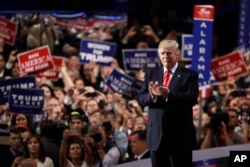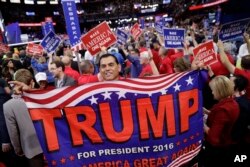Thirteen months after announcing his U.S. presidential bid, Donald Trump took to the stage in Cleveland, Ohio to utter the words that launched his unprecedented campaign.
“We will make America proud again. We will make America safe again,” Trump said. “And we will make America great again.”
It’s this promise that drove millions of Republicans to the polls during the primary and brought Trump the Republican nomination this week.
“Together, we will lead our party back to the White House, and we will lead our country back to safety, prosperity and peace,” Trump told Republican delegates in his acceptance speech late Thursday.
The businessman’s ability to tap into the national mood of what some say is a divided country could make it a close race between Trump and presumptive Democratic nominee Hillary Clinton, says American Enterprise Institute senior fellow Karlyn Bowman.
“He speaks to something in the electorate today,” Bowman says. “There is deep dissatisfaction with the way things are going in Washington and a real desire to shake things up.”
And Trump has certainly shaken up the race for American president.
Running unconventional race
Since announcing his decision to run, Trump has called for a temporary ban on Muslims entering the country and praised the leadership of Iraq’s Saddam Hussein.
Instead of torpedoing his campaign, the controversial comments have only seemed to bolster support for the Republican candidate.
“Trump’s appeal is someone who is different and someone who is not in the mold of Washington,” historian Allan Lichtman notes. “He calls himself the anti-politically correct candidate.”
The American University professor says Trump has been able to get away with some of his “loose and dangerous” comments on foreign leaders and immigration until now, but those very same statements will be used against him in Democratic advertising and campaigning in the weeks leading up to the November 8 election.
“He has not gotten the scrutiny that you are going to get between September and November when the race focuses and sharpens,” Lichtman says.
Others not only doubt he will change course, but say he has no choice but to double down.
“He's going to unfortunately have to exploit the racial and ethnic fear, discontent issues that have brought him to the Republican nomination,” says Stephen Wayne, a Georgetown University professor.
Wayne, author of The Road to the White House, says Trump has to cut into the demographic advantage the Democrats have in a national election, and inspire his base of largely white working-class voters.
A June 20 poll conducted by Monmouth University shows Clinton winning the minority (African-American, Hispanic and Asian) vote by 72 percent to Trump’s 17 percent.
In contrast, the Republican candidate led Clinton among white voters 49 to 38 percent.
“Donald Trump faces a strong, unified vote of minority groups against him, so he has got to dig into the white, blue collar Democratic vote primarily in the Midwestern states,” notes Wayne.
Moving forward - unified, focused & funded
Solidifying his base is one challenge. Political scientists say Trump’s main task between now and the election is to unite the Republican Party behind him.
“There are a lot of ways that this election would favor Trump, but right now Clinton is benefiting in the polls from greater unity on the Democratic side and a Republican Party that is pretty close to civil war,” says Jeffrey Anderson, senior fellow at the Hudson Institute.
Trump’s vice president pick, Indiana Governor Mike Pence, will help bridge the gap with conservatives and members of the Christian right in the Republican Party, says AEI’s Bowman.
“Pence has terrific conservative credentials, and so therefore he will help to unify the party,” she says. “He will be helpful as a fundraiser and he will also be very helpful down ballot in congressional races, because he is quite popular among the members.”
Going forward, analysts say Trump should shift his campaign to make it less about himself and more about the issues Americans care about, which will likely become more of an imperative during debates with Clinton.
“At this point, many people think the Trump campaign is all about Trump and not about the American people,” American University historian Lichtman says. “He has to reverse that image.”
The Republican candidate must also focus on the day-to-day of running a traditional campaign.
“To a large extent, it’s a question of whether he can continue to put together an actual full fledged campaign with fundraising and ad buying and grassroots get-out-the-vote efforts,” Anderson notes.
Clinton has the lead in fundraising so far, with her campaign entering June with $42 million in the bank versus Trump’s $20 million.
“Trump really needs to show that he is a credible and disciplined presidential candidate, capable of raising substantial sums of money, capable of organizing a real campaign,” Lichtman says.
The Hudson Institute's Anderson says Trump will likely be a force to be reckoned with once he gets more organized and focused.
"If Trump can get his campaign operation humming along a bit, Clinton will be forced to sit and play defense," he notes.
Regardless of the challenges Trump faces in the run-up to the November vote, Anderson says, this unconventional Republican presidential candidate’s political instincts should not be overlooked. “Trump did beat 16 other people [in the primaries]. I think it is foolish to underestimate him. He has shown he has some very good political instincts.”








